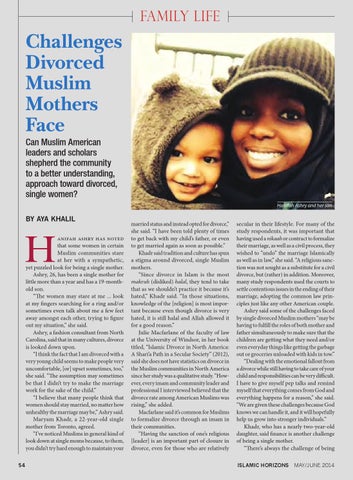FAMILY LIFE
Challenges Divorced Muslim Mothers Face Can Muslim American leaders and scholars shepherd the community to a better understanding, approach toward divorced, single women?
Hanifah Ashry and her son
BY AYA KHALIL
H
anifah Ashry has noted that some women in certain Muslim communities stare at her with a sympathetic, yet puzzled look for being a single mother. Ashry, 26, has been a single mother for little more than a year and has a 19-monthold son. “The women may stare at me ... look at my fingers searching for a ring and/or sometimes even talk about me a few feet away amongst each other, trying to figure out my situation,” she said. Ashry, a fashion consultant from North Carolina, said that in many cultures, divorce is looked down upon. “I think the fact that I am divorced with a very young child seems to make people very uncomfortable, [or] upset sometimes, too,” she said. “The assumption may sometimes be that I didn’t try to make the marriage work for the sake of the child.” “I believe that many people think that women should stay married, no matter how unhealthy the marriage may be,” Ashry said. Maryam Khadr, a 22-year-old single mother from Toronto, agreed. “I’ve noticed Muslims in general kind of look down at single moms because, to them, you didn’t try hard enough to maintain your
54
married status and instead opted for divorce,” she said. “I have been told plenty of times to get back with my child’s father, or even to get married again as soon as possible.” Khadr said tradition and culture has spun a stigma around divorced, single Muslim mothers. “Since divorce in Islam is the most makruh (disliked) halal, they tend to take that as we shouldn’t practice it because it’s hated,” Khadr said. “In those situations, knowledge of the [religion] is most important because even though divorce is very hated, it is still halal and Allah allowed it for a good reason.” Julie Macfarlane of the faculty of law at the University of Windsor, in her book titled, “Islamic Divorce in North America: A Shari’a Path in a Secular Society” (2012), said she does not have statistics on divorce in the Muslim communities in North America since her study was a qualitative study. “However, every imam and community leader and professional I interviewed believed that the divorce rate among American Muslims was rising,” she added. Macfarlane said it’s common for Muslims to formalize divorce through an imam in their communities. “Having the sanction of one’s religious [leader] is an important part of closure in divorce, even for those who are relatively
secular in their lifestyle. For many of the study respondents, it was important that having used a nikaah or contract to formalize their marriage, as well as a civil process, they wished to “undo” the marriage Islamically as well as in law,” she said. “A religious sanction was not sought as a substitute for a civil divorce, but (rather) in addition. Moreover, many study respondents used the courts to settle contentious issues in the ending of their marriage, adopting the common law principles just like any other American couple. Ashry said some of the challenges faced by single divorced Muslim mothers “may be having to fulfill the roles of both mother and father simultaneously to make sure that the children are getting what they need and/or even everyday things like getting the garbage out or groceries unloaded with kids in tow.” “Dealing with the emotional fallout from a divorce while still having to take care of your child and responsibilities can be very difficult. I have to give myself pep talks and remind myself that everything comes from God and everything happens for a reason,” she said. “We are given these challenges because God knows we can handle it, and it will hopefully help us grow into stronger individuals.” Khadr, who has a nearly two-year-old daughter, said finance is another challenge of being a single mother. “There’s always the challenge of being ISLAMIC HORIZONS MAY/JUNE 2014
